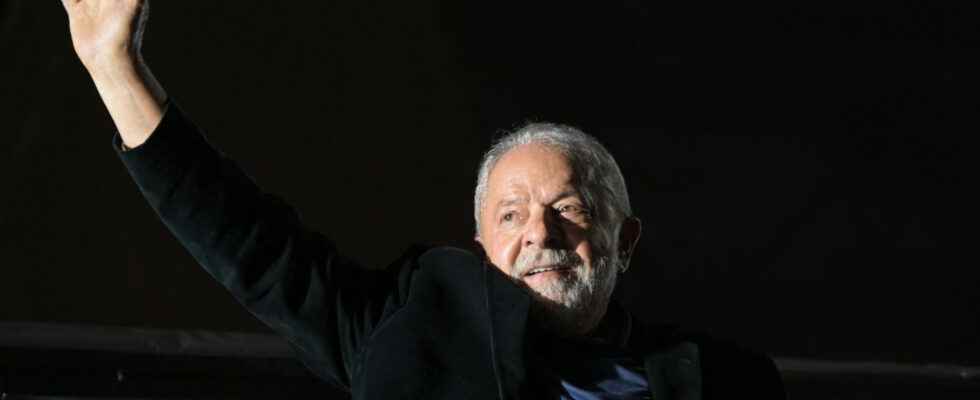The battle will be very tight. Former left-wing president Luiz Inácio Lula da Silva won 48.4% of the vote, compared to 43.2% for Jair Bolsonaro in the first round of the Brazilian presidential election. Lula da Silva won by a much smaller margin than predicted by polls on outgoing President Jair Bolsonaro.
“We have defeated the lies” of the polls, said the far-right president, who said he was optimistic about “playing the second half” of the presidential election. On the Lula side, a footballing metaphor: “It’s just an extension. I can tell you that we are going to win this election”, assured the ex-president (2003-2010). The two men stand out as much by their conception of power as by their radically different programs on questions of the environment, purchasing power or security. Europe 1 takes stock.
purchasing power
In this country of 213 million inhabitants with monster inequalities, more than 33 million people suffer from hunger and 9.9 million are unemployed. In order to improve the purchasing power of the poorest, Bolsonaro is counting on the allocations of the “Auxilio Brasil”, a new version of the “Bolsa Familia”, a flagship social program of the Lula years (2003-2010). The amount of this allowance has increased from 400 reais (about 80 euros) to 600 reais this year.
In its official program, it gives pride of place to job creation, especially for young people and women. The far-right president also promises to increase the share of the population exempt from income tax, further improve infrastructure in less developed areas and implement more privatizations.
Lula, for his part, pledges to launch a new “Bolsa Familia”: in addition to 600 reais from the “Auxilio Brasil”, families would receive 150 reais for each child under six. To improve purchasing power, he is betting in particular on an increase in the minimum monthly wage (currently at 1,212 reais, 240 euros) “above inflation”, without specifying an amount.
It also undertakes to set up a program to help the 70% of Brazilian families in debt to reschedule their repayments. Lula also intends to “strengthen social protection” by returning to the reform of the labor code adopted in 2017.
Environment and Amazonia
Much criticized by the international community for his environmental policy, Bolsonaro is committed to continuing military operations supposed to fight against deforestation and forest fires in the Amazon, which have increased sharply under his mandate. Its program evokes “measures to reduce greenhouse gases”, while recognizing that the fight against climate change is “inexorable” to preserve the future of the planet.
Statements greeted with skepticism by experts: the head of state is openly in favor of the expansion of mining activities in the Amazon, including in protected areas such as indigenous reserves. Lula, for his part, pledges to implement a zero-tolerance policy against illegal gold panning, deforestation and fires in the largest tropical forest on the planet.
In particular, he intends to rely on public bodies for the preservation of the environment such as Ibama, affected by major budget cuts under Bolsonaro.
International relationships
One of the main reproaches formulated by Lula against Bolsonaro is to have isolated Brazil on the international scene. The candidate of the Workers’ Party therefore promises to “restore” this international aura of Brazil, in particular by strengthening cooperation between the various countries of Latin America and with the African continent. In particular, he wants to relaunch Mercosur. Lula promises to travel around the world to restore or strengthen Brazil’s diplomatic relations.
Jair Bolsonaro focuses his international policy on Brazil joining the Organization for Economic Cooperation and Development (OECD) and increasing multilateral agreements with other countries.
Security
Bolsonaro pledges to increase the budget for the army and the police, while further easing access to firearms, to guarantee “the fundamental right to self-defense and individual freedom”. Jair Bolsonaro also wants to increase the budgets for public security, therefore the police and the army. He also proposed a law allowing security agents (police and military) to be the subject of no criminal prosecution or sanction when they commit crimes, including murder, even outside the framework of self-defence.
Lula wants to reform security policy, emphasizing “the prevention, investigation and treatment of crimes and violence against women, young black people and the LGBTQIA+ population”, as the ‘indicates the Brazilian media G1. Lula also promises a “new drug policy”, to put an end to the strategy of perpetual “war” against gangs. He wants to prioritize in-depth investigations and targeted actions to dismantle organized crime.
minorities
Lula promises to defend “the rights and territories of indigenous peoples”. He also undertook to create a “Ministry of Indigenous Peoples” and to appoint an indigenous person to head it. His program also includes social and security measures to defend the LGBT+ community in a country heavily affected by homophobic violence, as well as an increase in racial and social quotas in universities.
Bolsonaro, on the other hand, does not mention the LGBT+ community in his program and defends a “responsible use” of natural resources, by “reconciling environmental preservation and sustainable growth”, including in indigenous reserves.
